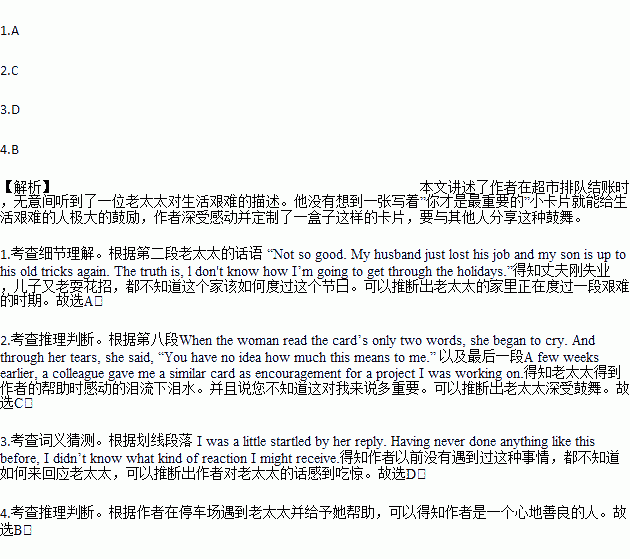题目内容
I was standing in the checkout line behind a woman who looked to be in her 60s. When it was her turn to pay, the cashier greeted her by name and asked her how she was doing.
The woman looked down, shook her head and said,“Not so good. My husband just lost his job and my son is up to his old tricks again. The truth is, l don't know how I’m going to get through the holidays.”
Then she gave the cashier food stamps (食品券).
My heart ached. I wanted to help but didn’t know how. Should I offer to pay for her groceries, ask for her husband’s resume?
As I walked into the parking lot, I spotted the woman returning her shopping cart. I remembered something in my purse that I thought could help her. It wasn't a handful of cash or an offer of a job for her husband, but maybe it would make her life better. My heart pounded (狂跳) as I approached the woman.
“Excuse me,” I said, my voice trembling a bit, “I couldn’t help overhearing what you said to the cashier. It sounds like you’re going through a really hard time right now. I’m so sorry. I’d like to give you something.”
I handed her the small card from my purse.
When the woman read the card’s only two words, she began to cry. And through her tears, she said, “You have no idea how much this means to me.”
I was a little startled by her reply. Having never done anything like this before, I didn’t know what kind of reaction I might receive. All I could think to say was, “Oh my. Would it be OK to give you a hug?”
After we embraced, I walked back to my car-and began to cry too.
The words on the card?
“You Matter.”
A few weeks earlier, a colleague gave me a similar card as encouragement for a project I was working on. When I read the card, I felt a warm glow spread inside of me. Deeply touched, I came home and ordered my own box of You Matter cards and started sharing them.
1.Which of the following is TRUE according to the first three paragraphs?
A. The woman and her family were having a tough lime.
B. The cashier helped the woman by giving her some food for free.
C. The woman’s family mainly depends on her son.
D. The author wondered why the cashier was familiar with the woman.
2.The woman cried when she got the card, probably because .
A. it could solve her present problem
B. she could use it to buy food
C. it greatly encouraged her
D. it could land her husband a job
3.The underlined word “startled”in Paragraph 10 probably means .
A. interested B. grateful
C. ashamed D. astonished[
4.From the article, we can tell that the author is .
A. a knowledgeable person B. a kind-hearted person
C. a horrible person D. a confident person
 王后雄学案教材完全解读系列答案
王后雄学案教材完全解读系列答案

 ill be on display in the supermarket
ill be on display in the supermarket